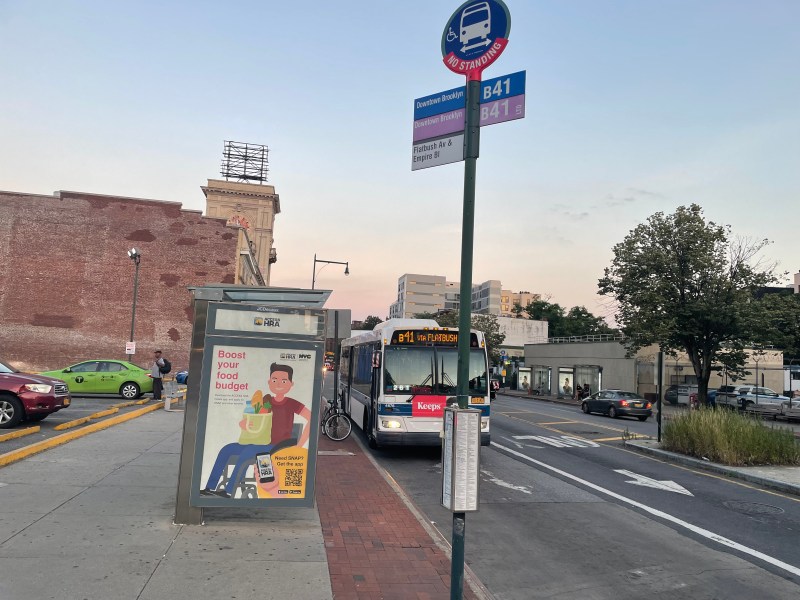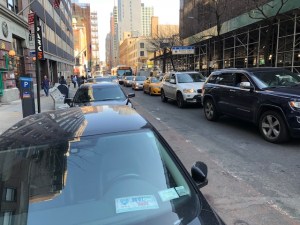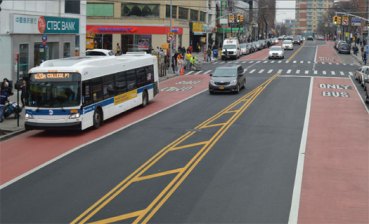DOT Begins Flatbush Ave. Bus Improvement Project With Everything on the Table

The journey of a seven-mile bus priority project begins with a single meeting.
The Department of Transportation and MTA kicked off one of the more ambitious bus priority projects in the city on Thursday with a public meeting on making Flatbush Avenue better for bus riders and pedestrians. Flatbush was identified as a 2022 project location in the Streets Master Plan.
Thursday night’s kickoff did not begin or end with any promised projects, beyond DOT Brooklyn Borough Commissioner Keith Bray saying that the agency is looking at both bus and pedestrian improvements along the entire stretch of road. Any upgrade in the DOT’s bus and pedestrian upgrade toolbox is in play, according to the agency, including curbside bus lanes, transit signal priority and painted pedestrian medians on the less intrusive side and center-running bus lanes, busways and concrete medians on the more ambitious end of the spectrum.
The DOT and MTA didn’t present any hard-and-fast plan to fix the problems with Flatbush Avenue, but the presentation on the seven-mile stretch of road made a case for drastic interventions. Roughly 118,000 people rode on 12 bus routes on the full stretch of Flatbush every day before the pandemic, including 22,500 riders on the B41 alone, a critical route that runs the length of Flatbush between Marine Park and Downtown Brooklyn. Bus bus speeds for the B41 Limited don’t get above 10 miles per hour on any segment of the road, according to the DOT.
The attempt to tackle all of Flatbush Avenue is nothing if not ambitious, as the DOT demonstrated with some statistics. It cuts through seven community boards, 985,000 people live along it, 59 percent of households don’t own a car, and 70 percent of residents take public transit to work compared to 21 percent who drive.

Because Flatbush is such a long stretch of road for the purposes of the bus and pedestrian priority project the DOT said that it broke the road up into three segments that had similar characteristics. One piece runs from Tillary Street to Empire Boulevard, one from Empire to Nostrand Avenue and the third segment from Nostrand to Kings Plaza. The agency also demonstrated how bus speeds work along pieces of the road, and most of the news for bus riders on the segments is pretty bad no matter where you are or what direction you’re going.

The DOT specifically noted that buses on Flatbush between Atlantic Avenue and Cadman Plaza crawl at excruciating speeds under 5 miles per hour going north during both the morning peak and south evening peak. During the morning rush, northbound buses between Atlantic and Empire and southbound buses between Church Avenue and Nostrand Avenue don’t move faster than 7 miles per hour, while the only evening rush hour segments where buses break 7 miles per hour are southbound buses between Atlantic Avenue and Empire Boulevard and southbound between Nostrand Avenue and Avenue N.

Flatbush Avenue is also dangerous, as the DOT pointed out that it crossed 10 different Vision Zero priority corridors (Tillary Street, Myrtle Avenue, Dekalb Avenue, Fulton Street, Lafayette Avenue, Atlantic Avenue, Linden Boulevard, Church Avenue, Nostrand Avenye and Avenue U). In total, 527 pedestrians, 206 cyclists, and 2,337 motor vehicle occupants were injured between Tillary Street and Avenue V between 2016 and 2020. Of those, 45 pedestrians, 14 cyclists and 96 occupants were severely injured, while seven pedestrians and two motor vehicle occupants were killed.
The varying traffic setups and road widths along Flatbush mean that the DOT isn’t committing to a single idea like a seven-mile busway or center-running bus lane. Instead, a DOT representative explained that different stretches of the road could wind up getting different treatments.
“What’s important here is that everything is on the table,” said DOT Director of Bus Priority Kyle Gebhart. “We’re looking at the whole corridor, but the corridor is very different in different parts and those different characteristics we covered a little bit. So we might mix and match some of the solutions from the toolbox.”
Gebhart also said that the dramatic length of the road and the differences in traffic patterns also explained why the outreach is starting before the technucal analysis.
“There’s going to be a technical analysis of side of this but we really wanted to start the outreach side,” he said.
The DOT’s timeline calls for outreach and data collection through the summer. In the fall, the agency will involve the many community boards along the avenue and possibly develop a community advisory board, as it has for other bus priority projects it has instituted since the Better Buses Restart in 2020.
The agency will also “develop conceptual plans” during that time, but the actual plan for the entire stretch of Flatbush won’t be revealed or implemented until 2023 at the earliest.
Many people on the Zoom call were supportive of the bus priority effort, but business interests are already saying that any loss of parking would be unacceptable because they claim their customers drive to Flatbush Avenue for their shopping needs.
“The pushback from members was quite striking, people were very unhappy, some were even angry thinking that there might be changes that would affect parking,” said Lauren Colllins, a representative of the Flatbush Avenue Business Improvement District between Clarkson Avenue and Cortelyou Road. “I just would hope that the DOT would really incorporate the small business community in a very large way in this because they’re impacted if suddenly parking lanes are taken away, and customers can’t pull up and shop for a while, which is usually how they do it.”
One meeting attendee almost immediately pushed back on Collins’s claim, saying that as a driver the last two years she’s paid for parking where it’s available, while also pointing out that riders who can’t efficiently take the bus to their destination also can’t shop on commercial stretches.
“There is perhaps an overestimation of how many people are relying on driving to get to places,” said Nina Sabghir. “The whole situation with the double-parking and everything else if you’re trying to get on and off the bus is difficult, and so those those may be a deterrent rather than actually benefiting businesses.”
Merchants are of course prone to overestimating how many of their customers drive to their shops, as Streetsblog showed with the case of Joe’s Pizza on 14th Street after the busway was installed there. City surveys have also shown. DOT survey data from a nearby bus improvement project on Church Avenue in 2019 found that just 7 percent of shoppers drove to the area.
Transit advocates also pushed back on the initial business complaints.
“Busways are great for business, bringing more customers from more neighborhoods more efficiently and affordably while also easing loading and unloading,” said Riders Alliance Policy and Communications Director Danny Pearlstein. “There’s always a period of adjustment but it’s essential to the city’s equitable development to put bus riders first after decades of slow and unreliable service.”
Stay tuned.

